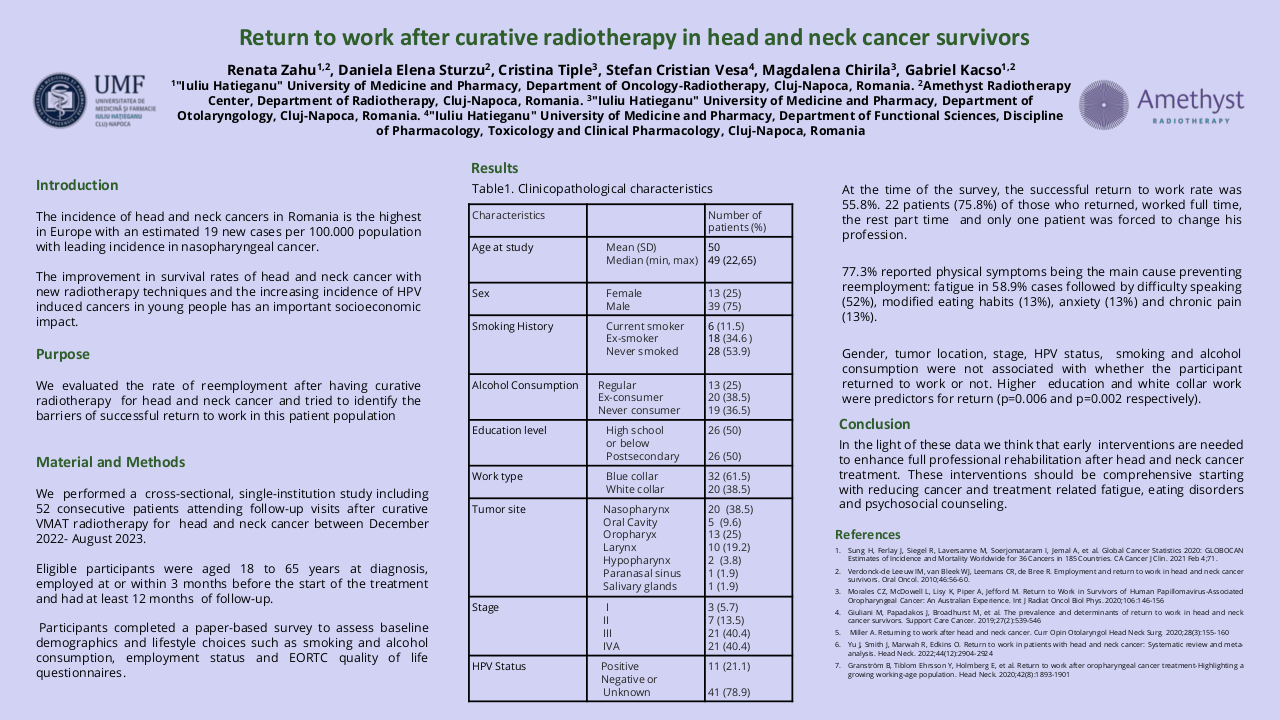Key concerns raised by patients in the post- radiotherapy/chemoradiotherapy head and neck cancer patient group as identified through the use of the electronic Holistic Needs Assessment (HNA) in the nurse-led post-treatment clinic.
Purpose/Objective
To identify the key concerns of head and neck cancer patients in post radiotherapy/chemoradiotherapy period in order to ensure adequate support and appropriate onward referral.
Material/Methods
From 2010, Macmillan have developed the eHNA for use with cancer patients, advising that these should be undertaken at diagnosis and at strategic points throughout the patient journey (Macmillan, 2014). The HNA is a means of discussing, gathering and recording information with the patient and/or caregiver. It allows for an assessment that is focused on the patient’s entire well-being and enables the development of a care plan that encompasses spiritual, emotional, mental, physical, social and environmental needs (National Cancer Action Team, 2007). This care plan is a document produced as a result of the discussion between the CNS (clinical nurse specialist) and the patient, is agreed jointly, and can be shared with primary care providers. The NHS Long Term Plan envisions personalised care for all patients, with HNAs as a key component in the cancer patient’s journey (National Health Service (NHS), 2019). As a result of this initiative, the eHNA has been implemented within the East and North Hertfordshire NHS Trust, due to its accessibility and ease of use for both patients and staff members.
The Macmillan Electronic Holistic Needs Assessment (eHNA) was utilized for this study. Patients score their concerns from 1 to 10, with 1 being low level of patient perceived concern, and 10 being high level of concern. Patients are able to pick more than one area of concern, and these are each scored individually. The eHNAs were offered to patients at the start of treatment and again at six weeks post-treatment. Over the four month period, 105 eHNAs were offered in total, with 9 patients declining the assessment and 10 assessments expiring before completion. 48 patients of the 105 were in the post-treatment setting, which will be the scope of this study. Data from this period was extracted and reviewed from the Macmillan My Care Plan web platform. Assessments were emailed out to patients to be completed in their own time at home; these were then discussed with the Clinical Nurse Specialists (CNSs) at their next clinic review (usually 2 weeks later). Patients without access to the internet or who were unable to complete these electronically for other reasons were able to complete with the help of the CNS in clinic.
Results
109 concerns were raised by the 48 patients; these are subdivided into 22 different concerns. The three highest scoring concerns were ‘Eating, appetite or taste’ with 22 patients identifying this with some level of concern, ‘Swallowing’ with 18 patients identifying concern, and ‘Pain’ with 11 patients identifying concern. These three concerns were not only most frequently selected by patients, but were also scored as being of high level of concern, with 16 of the 22 (73%) scoring ‘Eating, appetite or taste’ at a 5/10 or higher; 12 out of 18 (67%) patients scored ‘Swallowing’ as 5/10 or higher; ‘Pain or discomfort’ was graded over 5/10 by 8 of the 11 patients (73%). Infrequently selected concerns included ‘Hot flushes or sweating’, ‘Nausea or vomiting’, and ‘Taking care of others’. Of the 48 patients, 7 selected the ‘I have questions about my diagnosis, treatments or effects’ (15%). Further concerns and outcomes will be displayed within the poster.
Conclusion
As expected, this study has highlighted eating, swallowing and pain to be of highest level of concern for head and neck cancer patients in the post-treatment setting. Patients are currently supported by a multi-disciplinary team including dieticians and speech and language therapists (SLTs) throughout their treatment and the recovery period. The use of the holistic needs assessment during this period has allowed the patients the opportunity to be open about their concerns, which can sometimes be challenging for patients to raise in a clinic setting. It has also allowed the CNS team the opportunity to assess these needs and to start to think about what changes can make in practice to adequately support patient with their rehabilitation. Further audit of onward referrals will be carried out as a result of the highlighted concerns.
Macmillan (2014) Electronic Holistic Needs Assessment and Care Planning (eHNA). https://www.macmillan.org.uk/documents/aboutus/health_professionals/mac… (Accessed: 10/10/2023).National Cancer Action Team (2007) Holistic Common Assessment of Supportive and Palliative Care Needs for Adults with Cancer. NCAT, London.National Health Service (NHS) (2019) The NHS Long Term Plan. https://www.longtermplan.nhs.uk/online-version/ (Accessed: 10/10/2023).





